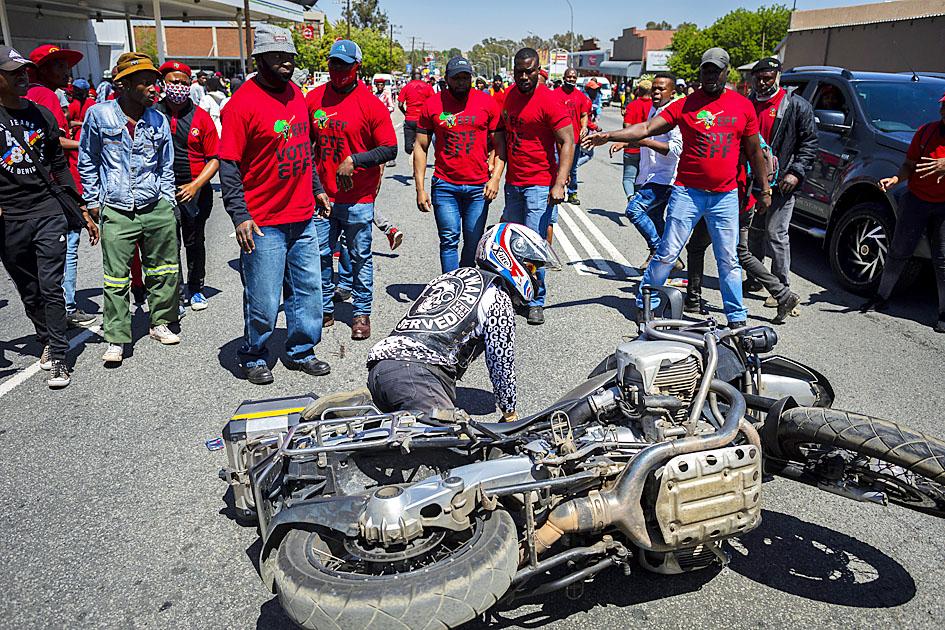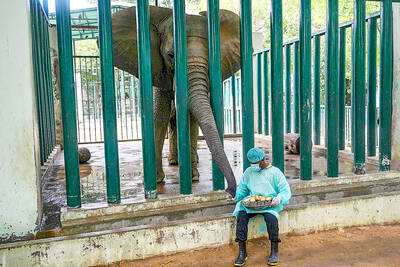White South African farmers and rival black protesters yesterday demonstrated in the central town of Senekal over a murder case that has reignited racial tensions still simmering 26 years after the end of apartheid.
The killing of Brendan Horner, a white man whose body was found tied to a pole at his farm in Free State Province, sparked riots at the start of this month, which prompted South African President Cyril Ramaphosa to make a statement urging South Africans to “resist attempts... to mobilize communities along racial lines.”
The farmers, who accuse the government of failing to protect them from violent crime, started arriving in pickup trucks ahead of a court hearing in Senekal for Horner’s two suspected killers. The farmers mostly wore khaki shirts and shorts, and a few wore military outfits.

Photo: EPA-EFE
“We are getting tired now of all the farm murders,” said Geoffrey Marais, 30, a livestock trader from Delmas, where a woman was strangled to death two weeks ago.
“Enough is enough. [The government] must start to prioritize these crimes,” he said.
The radical Economic Freedom Fighters (EFF), who represent poor black South Africans who feel left out of the country’s post-apartheid prosperity, staged a counter-march attended by thousands of protesters.
They work the group’s trademark red shirts and berets in the town center.
Police separated the two groups with razor wire in one street, but they regrouped and faced off in another area as police helicopters hovered overhead.
Despite the tensions, there were no reports of violence.
The EFF blames South Africa’s problems on what it says is a continued stranglehold of the economy by whites.
Several buses full of EFF supporters drove past the farmers singing “kill the boer [farmer]” out of the window as they headed into town.
“We are not scared of them. We are going to get them on Friday. We are going to face white men face to face,” the EFF’s firebrand leader Julius Malema was quoted as saying in the local press this week.
“I’m here because of white people... taking advantage of us,” said EFF supporter Khaya Langile, who came from the Johannesburg township of Soweto.
Tensions have been heightened by a government plan to expropriate white-owned land without compensation as part of an effort to redress economic inequalities that remain stark a quarter of a century after the end of apartheid.
About 70 percent of privately owned farmland in South Africa is owned by whites, who make up less than 9 percent of the country’s population of 58 million.

NO EXCUSES: Marcos said his administration was acting on voters’ demands, but an academic said the move was emotionally motivated after a poor midterm showing Philippine President Ferdinand Marcos Jr yesterday sought the resignation of all his Cabinet secretaries, in a move seen as an attempt to reset the political agenda and assert his authority over the second half of his single six-year term. The order came after the president’s allies failed to win a majority of Senate seats contested in the 12 polls on Monday last week, leaving Marcos facing a divided political and legislative landscape that could thwart his attempts to have an ally succeed him in 2028. “He’s talking to the people, trying to salvage whatever political capital he has left. I think it’s

Polish presidential candidates offered different visions of Poland and its relations with Ukraine in a televised debate ahead of next week’s run-off, which remains on a knife-edge. During a head-to-head debate lasting two hours, centrist Warsaw Mayor Rafal Trzaskowski, from Polish Prime Minister Donald Tusk’s governing pro-European coalition, faced the Eurosceptic historian Karol Nawrocki, backed by the right-wing populist Law and Justice party (PiS). The two candidates, who qualified for the second round after coming in the top two places in the first vote on Sunday last week, clashed over Poland’s relations with Ukraine, EU policy and the track records of their

UNSCHEDULED VISIT: ‘It’s a very bulky new neighbor, but it will soon go away,’ said Johan Helberg of the 135m container ship that run aground near his house A man in Norway awoke early on Thursday to discover a huge container ship had run aground a stone’s throw from his fjord-side house — and he had slept through the commotion. For an as-yet unknown reason, the 135m NCL Salten sailed up onto shore just meters from Johan Helberg’s house in a fjord near Trondheim in central Norway. Helberg only discovered the unexpected visitor when a panicked neighbor who had rung his doorbell repeatedly to no avail gave up and called him on the phone. “The doorbell rang at a time of day when I don’t like to open,” Helberg told television

A team of doctors and vets in Pakistan has developed a novel treatment for a pair of elephants with tuberculosis (TB) that involves feeding them at least 400 pills a day. The jumbo effort at the Karachi Safari Park involves administering the tablets — the same as those used to treat TB in humans — hidden inside food ranging from apples and bananas, to Pakistani sweets. The amount of medication is adjusted to account for the weight of the 4,000kg elephants. However, it has taken Madhubala and Malika several weeks to settle into the treatment after spitting out the first few doses they